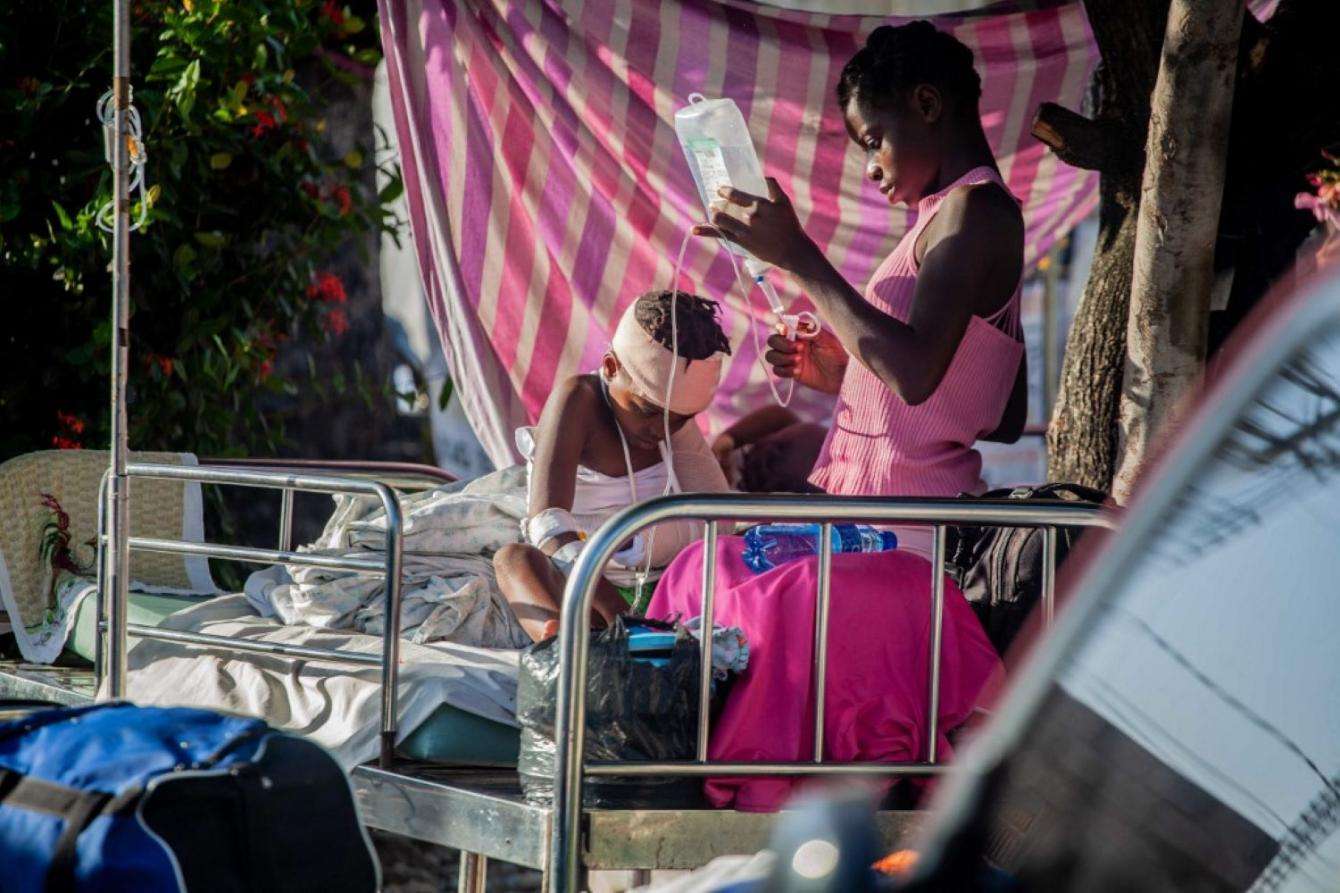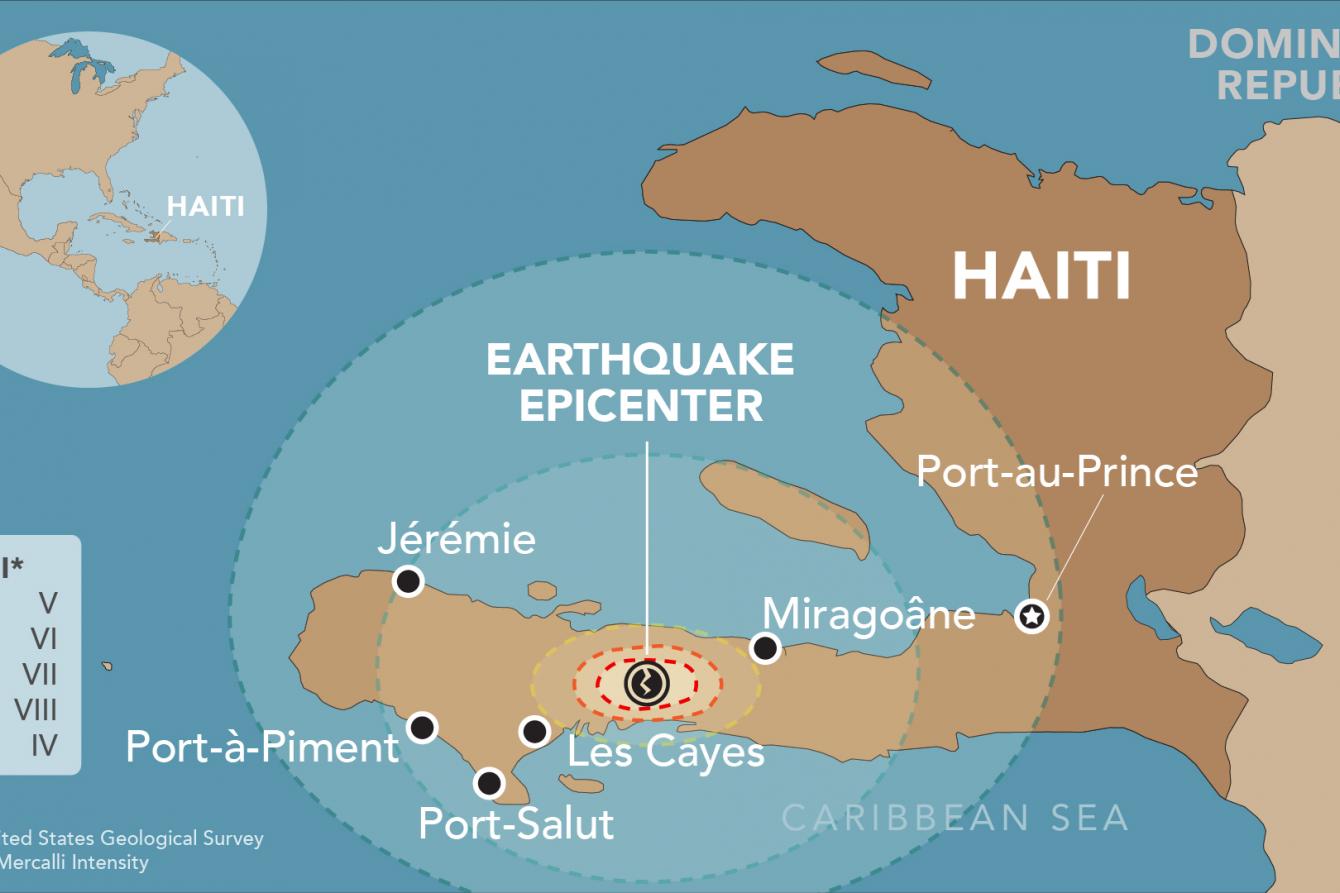Doctors Without Borders/Médecins Sans Frontières (MSF) is continuing to respond to the earthquake that shook Haiti this weekend and provide medical care to people who have been injured. The magnitude 7.2 earthquake struck the southern region of Haiti on Saturday, August 14, at 8:30 am local time. Our teams are on the ground providing help in the provinces of Grand’Anse, Nippes, and Sud, which were the areas worst affected. Our teams working in Port-au-Prince have also treated dozens of injured patients brought to the capital from the earthquake zone.
Landslides and flooding brought on by recent storms, including Tropical Storm Grace, have caused additional damage to areas where people are already struggling to access basic services like medical care.
MSF will continue to reinforce its response in the coming days. We are bringing in more emergency staff (including emergency coordinators), medical teams (including trauma surgeons), and water and sanitation and logistical experts. MSF is also preparing to send approximately 100 tons of medical and relief supplies to Haiti via two planes set to arrive this weekend. The cargo includes items for setting up emergency medical structures and offices for operations using tents, materials to install emergency drinking water supply systems for at least 30,000 people, and medical supplies for the care of 30,000 patients, including items for stabilization, first aid, vaccination, and blood collection.
The Haitian Civil Protection General Directorate (DGPC) says 137,000 families have been affected in the Grand'Anse, Nippes, and Sud provinces. According to the United Nations Office for the Coordination of Humanitarian Affairs (OCHA), approximately 500,000 people—40 percent of the total population in the affected provinces—are in need of emergency humanitarian assistance. The provisional death toll is now nearly 2,000, according to Haiti’s Office for Civil Protection, and more than 9,900 people have been injured as of August 18. These figures are expected to increase in the coming days. Many municipalities in the affected areas remain isolated from the rest of the country, making it difficult to get accurate death and injury counts.
In terms of infrastructure, nearly 61,000 homes were destroyed, and more than 76,000 homes were damaged in the three most affected provinces, according to Haiti’s Office for Civil Protection. This has left thousands of people without shelter and critical structures like hospitals, schools, hotels, churches, and businesses. According to initial assessments by OCHA, 24 health facilities were damaged or destroyed by the earthquake. Many hospitals had to evacuate their patients, and the facilities that continue to function are overwhelmed and experiencing a lack of medical equipment and medicines.
Making the situation worse for people in Haiti, from Monday evening to Tuesday morning, Tropical Storm Grace passed over Haiti’s southern peninsula, causing extremely heavy rains—up to 10 inches—and flooding. The storm has complicated rescue efforts by making more areas inaccessible and endangering tents and temporary structures being used for urgent medical care, aid, and shelter.

MSF operations in Haiti
Rapid response in Sud province
In the first hours after the earthquake, the MSF team based in Port-à-Piment and an emergency medical team from Port-au-Prince began assisting injured patients in Sud province. The hospital in Port-à-Piment where MSF runs a sexual and reproductive health project was damaged. The patients, most of them seeking maternity services, were evacuated to a tent where our team continues to provide care. In Port-à-Piment, MSF is also stabilizing patients injured by the earthquake, including patients MSF has managed to evacuate from nearby Les Anglais, which is cut off from the rest of the province due to road damage.
In Les Cayes, the capital of Sud province, an MSF team is providing support to the general hospital with medical supplies and human resources.
In Port-Salut, an MSF team is receiving patients with injuries and fractures, including patients referred from Port-à-Piment, Les Anglais, and Les Cayes, and providing stabilization, surgical, and follow-up care. On the first day of the response, 26 patients were received at this location.
MSF has also sent emergency supplies—including first aid kits, tents for emergency clinics, blood transfusion, and plastering equipment, as well as medicines—from our supply stock in Port-au-Prince to Sud. Teams continue to assess how MSF can provide medical and water and sanitation services to more remote communities.
Reaching remote areas in Nippes province
An MSF team arrived on August 15 in Nippes and visited two locations. The first, the Sainte-Thérèse hospital in Miragoâne, received 59 wounded people, a number of whom were referred to Port-au-Prince for further care for open fractures. MSF provided supplies to the hospital, and an MSF surgeon and nurse are providing medical support. At the second location—the town health center of Petit Trou—MSF’s team saw more visible damage, including to the water system. Most people were staying outside, out of fear of further collapse of buildings, including at hospital structures. The majority of medical consultations took place outside. MSF gave donations to the health center, and water trucking is being organized.
On August 17, MSF’s team moved to a third location in Nippes, Baradères, to assess the situation. The town is almost cut off from all routes, making it difficult to get aid and supplies to people who need them. Many families were observed sleeping outside near their demolished homes. There were also a few families attempting to build wooden structures. The hospital in Baradères had seen around 60 patients in the last 48 hours, and around 15 were referred to St. Therese in Miragoâne for further treatment. The MSF team donated medical supplies and is trying to find ways to access areas cut off from aid due to landslides blocking the roads.
Surgical care and supplies to Grand’Anse province
Some access routes, such as the road between Les Cayes and Jérémie, are seriously damaged, and complicate the delivery of aid. MSF is preparing to move supplies by sea and air due to the difficulties with the road. A medical team, including two surgeons and an operating room nurse, was able to travel to Jérémie on August 15 and began working in St. Antoine’s hospital, completing 10 surgeries in the last two days. MSF brought medical supplies, including sterilization material, for the medical facility. An MSF team also assessed needs in the hard-hit communes of Corail and Pestel, which are 80 percent destroyed, according to local authorities.

Emergency and trauma care in Port-au-Prince, Ouest province
In Port-au-Prince, Haiti’s capital city, the earthquake fortunately did not damage infrastructure or buildings. However, injured patients from affected areas in the south of the country have come to the city for care.
MSF is treating injured people in our trauma hospital in Tabarre. As of August 18, about 20 patients injured in the earthquake are being treated in the hospital.
On August 15, MSF began providing stabilization care to injured patients at a new emergency center in the Turgeau neighborhood of Port-au-Prince at the Integrated Diagnosis and Treatment Center (CDTI), commonly known as the Sacré-Cœur Hospital, which originally was not scheduled to open until later in the week. On the first day, 30 injured patients were admitted.
To address potential blood shortages, MSF quickly launched a blood collection campaign in Turgeau on August 14 just hours after the earthquake, in partnership with local authorities.
MSF has been present in Haiti for more than 30 years. Our regular activities continue, including at the Tabarre hospital in Port-au-Prince, where MSF is treating patients with severe burns as well as people with life-threatening injuries. MSF also provides maternal and sexual and reproductive health care in Port-a-Piment in Haiti's Sud province and treats victims of sexual and gender-based violence in Port-au-Prince and Gonaïves. After more than 15 years, MSF was forced to close its emergency center in Martissant, Port-au-Prince, after an armed group fired on the facility on June 26, putting medical staff and patients at risk. Earlier in the year, MSF was forced to relocate its burns hospital from Drouillard to Tabarre due to insecurity.




